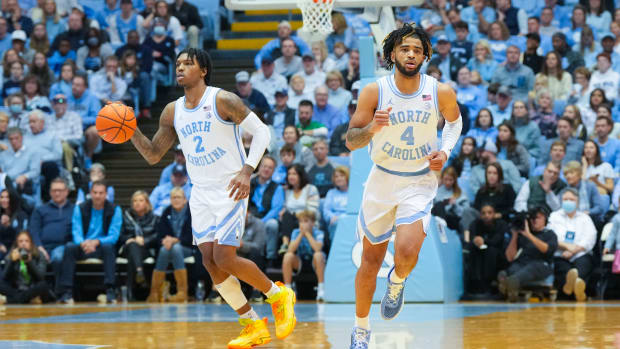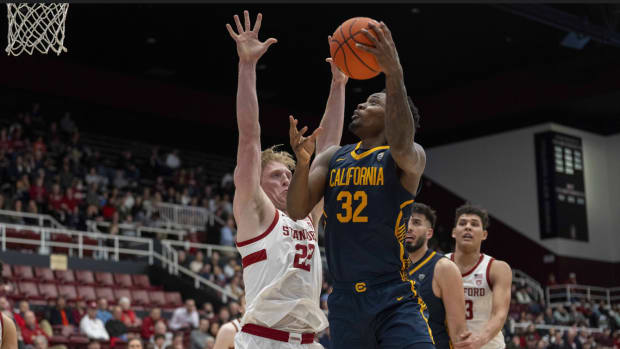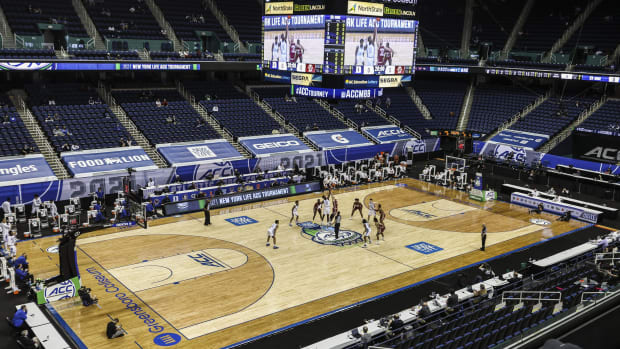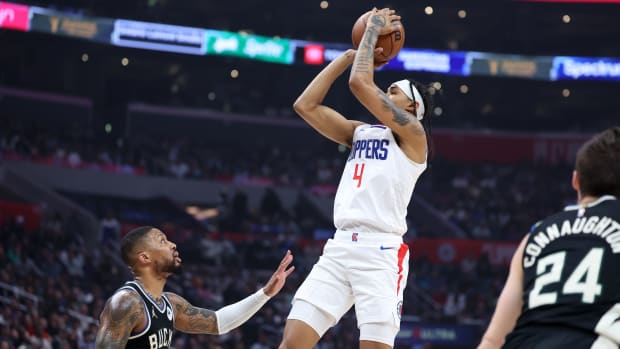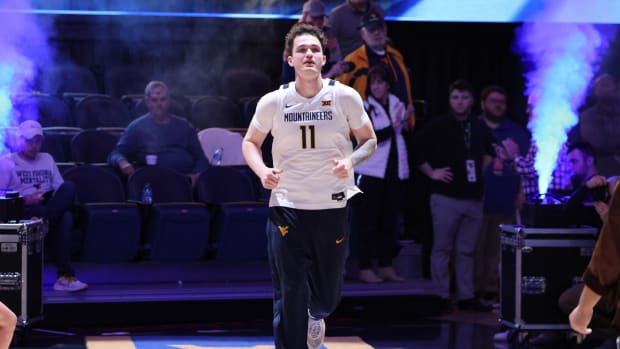How vulnerable are major programs to a coach leaving?
Whenever Syracuse coach Jim Boeheim decides to retire, the Orange should have a solid replacement in Mike Hopkins. (Kevin Rivoli/AP)
In a sport so heavily dominated by and influenced by coaches, every program is susceptible to some degree when it comes to coaching transition. Even the very bluest of blueblood programs -- North Carolina, Kentucky, Indiana, Arizona -- have had at least an occasional season or two with the wrong guy in charge leading to very disappointing campaigns. Only Kansas (Roy Williams to Bill Self) and Duke (Mike Krzyzewski) have pretty much remained unscathed, thanks in large part to a combined one change over three decades (and Kansas finding one of the best coaches in the nation as a replacement).
Connecticut seems to have gotten it right with Kevin Ollie replacing Jim Calhoun, but one season does not mark a full transition. Memphis reached incredible heights with John Calipari, and while Josh Pastner has done pretty well there, the program isn't at the same level it was under Calipari.
As we all wait to see what Butler decides to do in the aftermath of Brad Stevens' departure to the Boston Celtics -- with many believing former Bulldog and current Michigan assistant coach LaVall Jordan is the favorite -- it's worth reassessing which other name programs around the land may be facing interesting transitions at some point soon, and how at risk they are to suffer a dropoff.
Syracuse
Whenever Jim Boeheim decides to retire, the Orange should have a groomed replacement for him in head coach-in-waiting Mike Hopkins. Hopkins, a former Orange player, arrived on campus in 1989, joined the staff in 1995 and is watching and learning while waiting for his chance to take over. It's hard to have a better plan in place, given Hopkins' incredible patience and how well-regarded he is in inside circles.
Syracuse enters the revamped and ultra-competitive ACC this season, but still should have the advantages that makes it one of the nation's premier programs. As long as the Carrier Dome exists, the program will lead the nation in attendance, and the economic benefits of playing at home will continue to lead to home-heavy non-league schedules. The budget will remain ambitious and Boeheim's legacy will continue to be a plus. If there's a "Syracuse Way," Hopkins is very immersed in it.
There are never any guarantees when a legend walks away, but it looks like the Orange are in as good a position as possible to transition from that kind of coach.
Risk of dropoff: Low
Duke
Whomever replaces Mike Krzyzewski will obviously be compared to him, which is pretty much ridiculous because there's a solid argument that he is the most successful coach in the sport's history. He has four national titles, two (heading toward three) Olympic gold medals, moving rapidly toward 1,000 career wins, with very, very few dips from elite status, all the while bringing a bazillion dollars in positive marketing exposure to the university. It's extraordinarily impressive.
So where do the Blue Devils turn when K eventually decides it's time to step down, which shouldn't be at least until the 2016-17 season given his re-commitment to the U.S. Olympic team? Krzyzewski has resisted an official succession plan like that in place at Syracuse, although he's noted repeatedly that he would like the successor to come from in-house.
As colleague Pete Thamel wrote this spring, Duke has had tremendous continuity with its assistant coaches, although one long-timer, Chris Collins, took the Northwestern job earlier this offseason. That leaves Steve Wojciechowski as the primary assistant. Picking from his tree, Krzyzewski will have a number of options to sift through, given Tommy Amaker, Johnny Dawkins, Mike Brey and others have established head coaching credentials elsewhere.
Duke has the largest basketball budget in the nation (although a huge chunk of that is Krzyzewski's salary; whether that would maintain with a new lower-paid coach will be interesting). The Blue Devils have one of the most famous arenas in the sport and a top spot in what should evolve into the nation's premier conference (with all respect to the Big Ten). But when nothing has changed at the top in decades and a program is really the work of one man, you never know how it will go going forward, especially when the standard set by that man -- 15 top-2 seeds in the last 17 NCAA tournaments -- is so profound.
Risk of dropoff: Medium, due to incredible standards and lack of clear successor.
North Carolina
Roy Williams is a bit younger than either Boeheim or Krzyzewski, so this transition could be a little farther off, but it doesn't make it any less important for the Tar Heels. The last time the program tried to replace a legendary coach (Dean Smith), it waded through Bill Guthridge and then Matt Doherty before finally luring Williams from Kansas. Williams has subsequently won two national titles in Chapel Hill and has the program building back toward elite contention again.
A couple of post-title mass exoduses have made North Carolina's run under Williams more variable than his elite counterparts, but there's no denying the overall level of success he's had, with six Elite Eights over an eight-year run.
Same league as Duke, same kind of tradition, bigger arena, slightly less overt fan passion, but the opportunity is pretty much the same. You can win national titles at North Carolina, and that's what the expectation is from the fanbase.
The Tar Heel coaching tree is quite expansive, and like Duke has with Krzyzewski, there will be a number of choices to consider. Will Hubert Davis be the guy? He somewhat fits the Kevin Ollie mold as NBA guy who came back to the school to join the staff (without Ollie's pro coaching experience, but with ample college broadcast experience and name recognition).
Unlike Syracuse or Duke, though, we already have seen what can happen if North Carolina makes a subpar choice. The overall trend was down, even if you exclude Doherty's 8-20 disaster in 2001-02 as an outlier. This one should be interesting to watch, although Williams' potential longevity in the position may change the dynamic -- and the pecking order of candidates -- significantly by the time he's ready to step down.
Risk of dropoff: Medium-high. No ready-made candidate at this point, program history of so-so transition from former legend.


